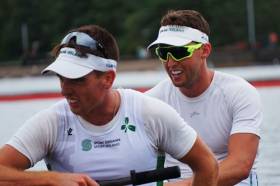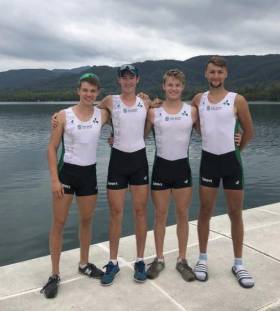Displaying items by tag: Ryan Ballantine
Gary O'Donovan Tenth Overall at World Rowing Championships
#Rowing: Ireland's Gary O'Donovan took fourth in his B Final of the lightweight single sculls at the World Rowing Championships in Linz-Ottensheim.
Rainer Kepplinger of Austria won, with O'Donovan part of group close behind. The finish puts O'Donovan 10th overall here.
Alice Arch of Australia won the women's lightweight single, with Ireland's Lydia Heaphy fifth. Heaphy had led through the first quarter.
The Ireland lightweight quadruple took second to the United States in their B Final.
World Rowing Championships, Linz-Ottensheim, Day Six (Irish interest)
Men
Lightweight Quadruple - B Final: 1 United States 6:03.94, 2 Ireland (H Sutton, M Taylor, R Ballantine, J McCarthy) 6:06.62.
Lightweight Single - B Final (places 7 to 12): 1 Austria (R Kepplinger) 7:00.16; 4
Ireland (G O'Donovan) 7:02.18.
Women
Lightweight Single - B Final (places 7 to 12): 1 Australia (Alice Arch) 7:52.59; 5 Ireland (L Heaphy) 7:55.40.
#Rowing: The Ireland pair of Mark O’Donovan and Shane O’Driscoll just missed out on a qualifying for the quarter-finals at the World Rowing Championships in Austria today.
The Skibbereen men had to be in the top two in their repechage, but in a three-boat finish, Chile pipped Greece and Ireland were just .66 of a second off qualifying. They go to the E Final.
The lightweight quadruple of Hugh Sutton, Miles Taylor, Ryan Ballantine and Jake McCarthy finished fourth in their heat and will compete in a repechage as they attempt to make the A Final. Italy were very strong and won well, staying clear of Denmark and Austria. Italy qualified for the A Final.
World Rowing Championships, Linz, Austria, Day Two (Irish interest)
Men
Pair - Repechage Two (First Two to Quarter-Finals; Third to Final E): 1 Chile 6:43.70, 2 Greece 6:43.71; 3 Ireland (M O’Donovan, S O’Driscoll) 6:44.35.
Lightweight Quadruple – Heat One (Winner to A Final; rest to Repechage): 4 Ireland (H Sutton, M Taylor, R Ballantine, J McCarthy) 6:04.84
Ireland Lightweight Quad Fifth in the World
#Rowing: Ireland’s lightweight quadruple of Fintan McCarthy, Ryan Ballantine, Jake McCarthy and Andrew Goff took fifth in the A Final of the World Championships today. Germany raced well, winning a contest with Italy, who took second. Turkey, Ireland and Denmark fought it out for the bronze. The Turks took the honours, while Denmark’s fast finish pushed Ireland back to fifth in the world.
Men
Lightweight Quadruple – A Final: 1 Germany 5:51.21, 2 Italy 5:52.85, 3 Turkey 5:53.95; 5 Ireland (F McCarthy, R Ballantine, J McCarthy, A Goff) 5:56.64.
Double – Semi-Final One (First Three to A Final; rest to B Final): Britain 6:06.59, 2 New Zealand 6:08.00, 3 Romania 6:08.17; 5 Ireland (P Doyle, R Byrne) 6:10.95.
Women
Eight – Repechage (First Four to A Final): 4 Britain (8 R Shorten) 6:04.63.
Single Sculls – A/B Semi-Final (First Three to A Final; rest to B Final): 1 Ireland (S Puspure) 7:23.01, 2 Denmark (F-U Erichsen) 7:30.73, 3 Germany (A Thiele) 7:32.74.
Ireland Lightweight Quadruple Qualifies for World Rowing Final
#Rowing: Ireland’s lightweight quadruple of Fintan McCarthy, Ryan Ballantine, Jake McCarthy and Andrew Goff secured an A Final place at the World Rowing Championships in Plovdiv, Bulgaria, this morning. They took the second and final qualification place in their repechage. Turkey and Ireland showed they meant business right through the race, with only Algeria and then Norway showing signs of being able to upset this leading order. Turkey were excellent in the second half of the race, moving over a length clear of Ireland, who were content to find their way to the final.
World Rowing Championships, Plovdiv, Bulgaria, Day Four (Irish interest)
Lightweight Quadruple Sculls – Repechage One (First Two to A Final): 1 Turkey 5:51.12, 2 Ireland (F McCarthy, R Ballantine, J McCarthy, A Goff) 5:54.09

























































